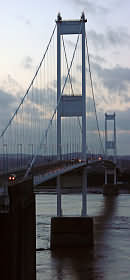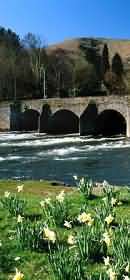
The Local Time is Saturday, 27-Jul-2024 16:55:00 CEST
Monmouth Tourist Information and Travel Guide |
|
|||
| YOU ARE HERE: Main Home Page > Monmouthshire > Monmouth |
|
|
Monmouth in the County of Monmouthshire
|
|||||
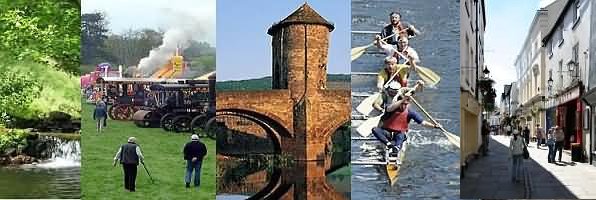 |
|||||
Monmouth is an elegant town with a splendid location at the confluence of three rivers - the Trothy, Monnow and, more famously, the river Wye. Its world famous gateway, on the Monnow Bridge, is unique in Britain and befits the town’s proud past. The town overlooks the hills of Abergavenny, Hay Bluff, and the Brecon Beacons making a superb view and a must on a tour of the Royal Forest of Dean and Wye Valley. Monmouth is a town for all seasons, with markets and shops bustling during the day. During the evening, the towns' pubs, clubs and halls tap to the beat of a huge variety of social events. Monmouth's location makes it the perfect centre for touring, sight-seeing and sampling the activities and attractions of the nearby villages, towns and cities. Monmouth's strong natural defensive position - protected by its two rivers, the Wye and the Monnow, and guarding routes into Wales - was exploited by the Romans, although today's market town was founded by the Normans. Their castle, the earliest part of which remains, was established just after the Conquest, soon to be joined by a Benedictine priory and a market. The commercial settlement, which grew under the protection of the castle, developed into a medieval borough, dependent on river trade. The town flourished as county town, host to the assizes. Although the layout of the town is medieval, the overall appearance reflects Monmouth's two centuries of greatest prosperity and vitality, from the late-seventeenth century. During Roman times a small Roman garrison was stationed here (named Blestium), Monnow Bridge Tower is a rare 14th century stone gate tower, founded by Henry of Lancaster. Defended on the Welsh side of the River Monnow, by the Clawdd Ddu rampart and ditch and originally built with a single arched passage, it fortified the late 13th century bridge. In the 19th century, the gatehouse was pierced for pedestrian use and a hipped roof added to the upper storey. Sadly it is now the only remaining example in Britain, where the gate actually stands on a medieval river bridge.
Despite Edward I's enforced union of Wales with England the area lay within the Marches of Wales which did not send representatives to Parliament but were ruled by the Lords Marchers. These Lordships lay beyond the jurisdiction of the King's Courts and where governed by their own ancient laws and customs which were administered by their Lords in their own Courts.
|
|||||
|
|||||
| BACK TO TOP | |||||
|
|||||
| BACK TO TOP | |||||
Monmouth in the Wye Valley |
|||||
| This page last modified Tuesday, 28-May-2019 11:02:43 CEST | |||||
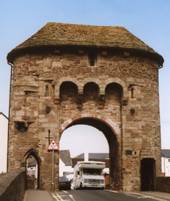 since then archeologists have found many exhibits of pottery, coins and jewellery. During early Norman times the geographical area of Monmouthshire had its own native rulers who were tributary to the Kings of Wales and sometimes to the King of England.
since then archeologists have found many exhibits of pottery, coins and jewellery. During early Norman times the geographical area of Monmouthshire had its own native rulers who were tributary to the Kings of Wales and sometimes to the King of England. 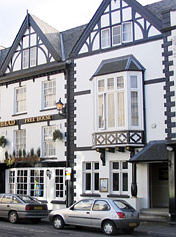 Monmouth boasts some fine
Monmouth boasts some fine 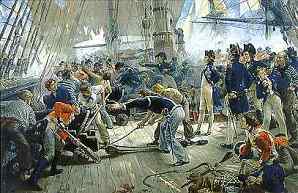 The town celebrates its famous sons. King Henry V was born in Monmouth. His statue on the Shire Hall and a ‘King’s Garden’ commemorate his birth at the castle in 1387.
The town celebrates its famous sons. King Henry V was born in Monmouth. His statue on the Shire Hall and a ‘King’s Garden’ commemorate his birth at the castle in 1387. 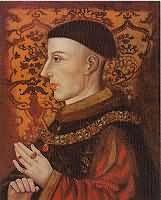 This was changed by Henry VIII who by the Laws in Wales Act of 1535 divided the Marches into the counties of Monmouth, Brecknock, Radnor, Montgomery and Denbigh, incorporating them once and for ever with the realm of England. In 1549 Edward VI granted a Charter to Monmouth which was described as being "in the Marches of Wales". The following writers describe Monmouthshire as being in Wales: Humphrey Llwyd (History of Cambria 1568); Churchyard (Worthiness of Wales 1587); Drayton (Polyolbion 1613); Enderbie (1666; and Doddridge (Historical Account of the Prince of Wales 1714). Towards the end of the reign of Charles II,
This was changed by Henry VIII who by the Laws in Wales Act of 1535 divided the Marches into the counties of Monmouth, Brecknock, Radnor, Montgomery and Denbigh, incorporating them once and for ever with the realm of England. In 1549 Edward VI granted a Charter to Monmouth which was described as being "in the Marches of Wales". The following writers describe Monmouthshire as being in Wales: Humphrey Llwyd (History of Cambria 1568); Churchyard (Worthiness of Wales 1587); Drayton (Polyolbion 1613); Enderbie (1666; and Doddridge (Historical Account of the Prince of Wales 1714). Towards the end of the reign of Charles II, 